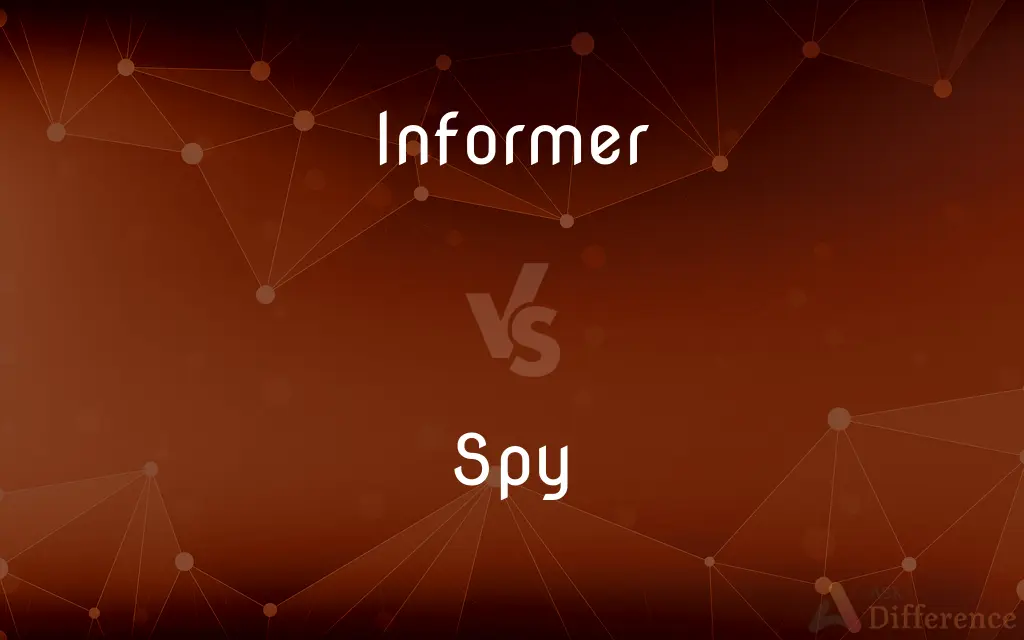Informer vs. Spy — What's the Difference?
By Maham Liaqat & Urooj Arif — Updated on March 21, 2024
An informer provides information, often covertly, about a group or individual, while a spy gathers intelligence, typically for a government or organization.

Difference Between Informer and Spy
Table of Contents
ADVERTISEMENT
Key Differences
An informer is someone who provides crucial information about a group, organization, or individual, often doing so secretly and sometimes out of personal interest or for a reward. Spies, on the other hand, are individuals who are specifically employed or tasked by governments, agencies, or organizations to covertly collect and relay intelligence, often concerning matters of national security or corporate espionage.
Informers can be found within any context where information is valuable, such as criminal gangs, corporate environments, or social groups, and they might not always be aligned with official agencies. Spies, whereas, are usually trained and part of a structured intelligence gathering operation, working within the framework of national defense, intelligence agencies, or corporate espionage units.
The motivation behind an informer's actions can vary widely, from financial incentives, coercion, or moral convictions, to personal vendettas. In contrast, spies typically operate based on duty, patriotism, or professional obligation, and they often undergo rigorous training for their roles.
While informers might provide information without necessarily engaging in extensive undercover work or assuming false identities, spies usually engage in deeper levels of deceit, including assuming false identities, and they often use sophisticated techniques and technologies to gather intelligence.
Understanding the distinction between an informer and a spy is crucial, especially in legal, military, and corporate contexts, where the nature of the information and the manner in which it is obtained can have significant implications.
ADVERTISEMENT
Comparison Chart
Definition
An individual who provides information about others, often covertly
A person who secretly collects and reports information on the activities, movements, and plans of an enemy or competitor
Context
Any environment where information is valuable, including criminal organizations, corporations, or social groups
Typically associated with government intelligence agencies, military operations, or corporate espionage
Motivation
Can vary from financial gain, coercion, moral convictions, to personal reasons
Often driven by duty, patriotism, professional obligation, or financial compensation
Operation
May simply relay information without engaging in extensive undercover activities
Usually involves covert operations, including surveillance, assuming false identities, and using advanced technologies
Training
Not necessarily trained for espionage activities
Often undergoes specialized training in intelligence gathering, surveillance, and operational tactics
Compare with Definitions
Informer
An individual who secretly provides information about others, typically without formal espionage training.
An informer within a criminal organization might leak details to the police.
Spy
Primarily associated with government or corporate intelligence operations.
Corporate spies might seek trade secrets from competitors.
Informer
Often involves relaying information without extensive covert activities.
An informer might pass tips to journalists about corporate misconduct.
Spy
Driven by professional obligations, duty, or financial incentives.
A spy may operate out of patriotism or a sense of duty to their country.
Informer
Can operate within any group where insider information is valuable.
An employee informer might report unethical practices to company executives.
Spy
Receives specialized training in surveillance, intelligence, and operational tactics.
Government spies undergo rigorous training in espionage techniques.
Informer
Ranges from personal gain to moral convictions.
An informer might report criminal activities to avoid legal consequences.
Spy
A professional engaged in gathering intelligence, often for national security.
A spy might infiltrate a foreign government to collect sensitive information.
Informer
Generally lacks formal espionage education.
A civilian informer providing police with leads may have no intelligence training.
Spy
Engages in deep undercover work, employing advanced techniques.
Spies might use surveillance tech and assume false identities for missions.
Informer
An informant, especially one who informs against others for compensation.
Spy
One who secretly collects information concerning the enemies of a government or group.
Informer
One who informs someone else about something.
Spy
One who secretly collects information for a business about one or more of its competitors.
Informer
A person who tells authorities about improper or illegal activity.
Spy
One who secretly keeps watch on another or others.
Informer
One who informs, animates, or inspires.
Spy
To watch or observe secretly
Was sent to spy out the enemy camp.
Informer
One who informs, animates, or inspires.
Nature, informer of the poet's art.
Spy
To discover by close observation
"[They] are continually prowling about on all three decks, eager to spy out iniquities" (Herman Melville).
Informer
One who informs, or imparts knowledge or news.
Spy
To catch sight of; see
Spied the ship on the horizon.
Informer
One who informs a magistrate of violations of law; one who informs against another for violation of some law or penal statute.
Spy
To engage in espionage.
Informer
One who reveals confidential information in return for money
Spy
To investigate or observe something, especially in secret
Spying into the neighbor's activities.
Spy
A person who secretly watches and examines the actions of other individuals or organizations and gathers information on them (usually to gain an advantage).
Spy
(intransitive) To act as a spy.
During the Cold War, Russia and America would each spy on each other for recon.
Spy
(transitive) To spot; to catch sight of.
I think I can spy that hot guy coming over here.
Spy
(intransitive) To search narrowly; to scrutinize.
Spy
(transitive) To explore; to see; to view; inspect and examine secretly, as a country.
Spy
To gain sight of; to discover at a distance, or in a state of concealment; to espy; to see.
One, in reading, skipped over all sentences where he spied a note of admiration.
Spy
To discover by close search or examination.
Look about with your eyes; spy what things are to be reformed in the church of England.
Spy
To explore; to view, inspect, and examine secretly, as a country; - usually with out.
Moses sent to spy out Jaazer, and they took the villages thereof.
Spy
To search narrowly; to scrutinize.
It is my nature's plagueTo spy into abuses.
Spy
One who keeps a constant watch of the conduct of others.
Spy
A person sent secretly into an enemy's camp, territory, or fortifications, to inspect his works, ascertain his strength, movements, or designs, and to communicate such intelligence to the proper officer.
Spy
(military) a secret agent hired by a state to obtain information about its enemies or by a business to obtain industrial secrets from competitors
Spy
A secret watcher; someone who secretly watches other people;
My spies tell me that you had a good time last night
Spy
Catch sight of
Spy
Watch, observe, or inquire secretly
Spy
Secretly collect sensitive or classified information; engage in espionage;
Spy for the Russians
Common Curiosities
Can an informer also be a spy?
While an informer can engage in spy-like activities, the term "spy" usually implies formal affiliation and training with an intelligence organization.
Is spying always illegal?
The legality of spying depends on jurisdiction and context; it's often sanctioned by governments but illegal under international and domestic laws when unauthorized.
What protections do informers have?
Informers may be offered legal protections, anonymity, or immunity in exchange for their information, depending on the situation and legal framework.
Are all spies government employees?
Most spies work for government agencies, but corporate spies gather intelligence for private companies.
What risks do spies face?
Spies face numerous risks, including legal repercussions, physical danger, and psychological stress from living undercover.
What is corporate espionage?
Corporate espionage involves the gathering of trade secrets or proprietary information from competitors for competitive advantage.
Can someone be an unintentional informer?
Yes, individuals can unintentionally provide sensitive information, thereby acting as informers without deliberate intent.
How are informers recruited?
Informers can be recruited through coercion, persuasion, financial incentives, or they might volunteer information motivated by personal reasons.
Are informers paid for their information?
Informers can be, and often are, compensated for their information, especially if the information leads to significant outcomes.
How do spies communicate securely?
Spies use a variety of secure communication methods, including encrypted devices, coded messages, and secure drop sites.
Are there ethical concerns associated with using informers and spies?
The use of informers and spies raises ethical questions related to privacy, consent, and the potential for abuse of power or information.
Do spies only work internationally?
Spies can operate both domestically and internationally, depending on their mission and objectives.
How do agencies ensure the reliability of informers?
Agencies typically corroborate informer-provided information through multiple sources and methods to ensure its reliability.
Can informers be part of witness protection programs?
In certain cases, especially in criminal justice contexts, informers may be placed in witness protection programs for their safety.
Can informers be considered whistleblowers?
Informers who expose wrongdoing within their own organizations can be considered whistleblowers, especially when motivated by ethical concerns.
Share Your Discovery

Previous Comparison
Clearance vs. Clearing
Next Comparison
Iniquity vs. MoralAuthor Spotlight
Written by
Maham LiaqatCo-written by
Urooj ArifUrooj is a skilled content writer at Ask Difference, known for her exceptional ability to simplify complex topics into engaging and informative content. With a passion for research and a flair for clear, concise writing, she consistently delivers articles that resonate with our diverse audience.















































